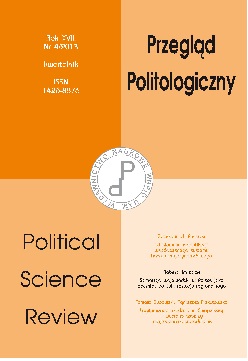W kierunku modyfikacji współczesnego systemu handlu międzynarodowego
Towards the modification of the modern system of international commerce
Author(s): Zdzisław W. PuśleckiSubject(s): Politics / Political Sciences
Published by: Uniwersytet Adama Mickiewicza
Keywords: system handlu międzynarodowego; modyfikacja; system of international commerce; modification
Summary/Abstract: The primary goal of this analysis is to present the necessity for the improvement of the system of international commerce and its reform. Detailed goals involve the presentation of the opportunities for a new model of the WTO’s functioning to emerge, curbing of EU agricultural neoprotectionism, the necessity of changing the system of direct payments following from the EU’s Common Agricultural Policy towards the WTO, the issues of food security, improvement of the food supply chain, and the increased importance of bilateral agreements and normative solutions, the increased role and significance of the G-20 as an important and influential global institution, and the necessity of increasing the integrity and transparency of derivatives on commodity markets. The failure of the WTO Doha round of negotiations resulted from the determined standpoint taken by the developing states on the issue of developed countries decreasing agricultural subsidies, and the difference of opinions between the US and EU on the issue of the level to which agricultural subsidies should be reduced. Given the perspective of the WTO, it is crucial to reduce the EU’s agricultural neoprotectionism and to continue the alignment of this policy’s mechanisms to the new conditions posed by the developing global economy and the principles of the WTO. Ensuring global food security is a particular challenge. The EU should also contribute to the improved functioning of the food market on a global and regional level, ensuring also more market transparency. In the modern multipolar world, regional agreements and relations are becoming increasingly important, and following the failure of the Doha round – bilateral ones as well. Also significant from the theoretical point of view, the practical reasons are becoming less significant in favor of normative solutions, in particular in the case of developing states. In future, the essential reforms of the WTO should allow it to continue to stimulate the liberalization of global commerce and, to a larger extent, support progress in developing countries, mainly owing to aid for trade. The role and significance of the G-20 has clearly increased, as concerns financial issues and international commerce. Both the WTO and G20 should jointly take steps to coordinate their efforts to promote the principles of open international commerce and increase the access of developing countries to the global market. Supporting open commercial principles in the global system will contribute to the legitimization of the G-20.
Journal: Przegląd Politologiczny
- Issue Year: 2013
- Issue No: 4
- Page Range: 59-84
- Page Count: 26
- Language: Polish

